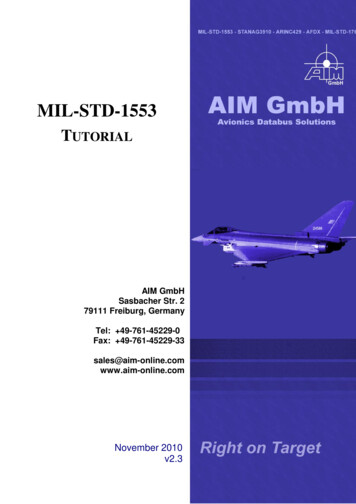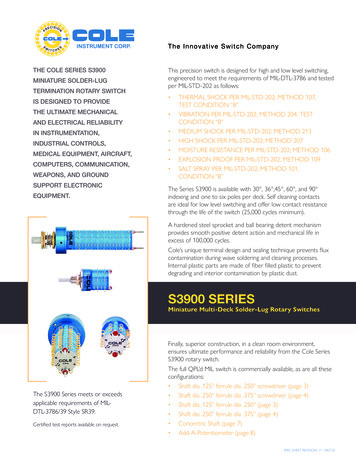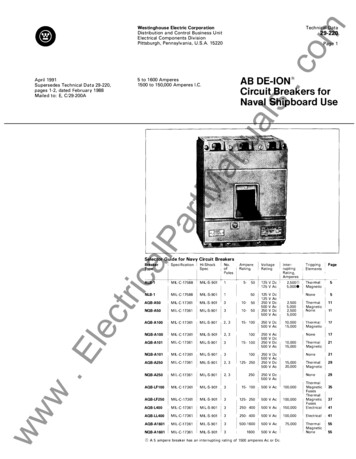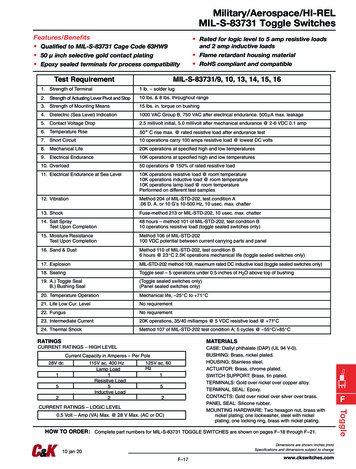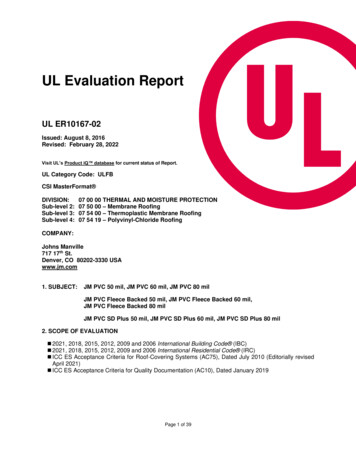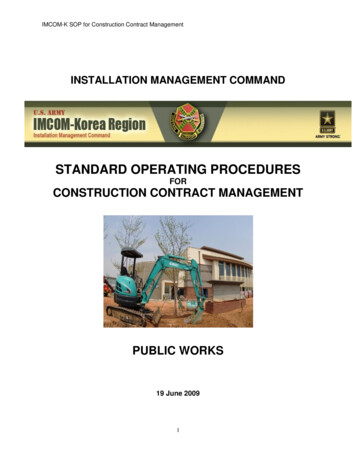
Transcription
IMCOM-K SOP for Construction Contract ManagementINSTALLATION MANAGEMENT COMMANDSTANDARD OPERATING PROCEDURESFORCONSTRUCTION CONTRACT MANAGEMENTPUBLIC WORKS19 June 20091
IMCOM-K SOP for Construction Contract Management2
IMCOM-K SOP for Construction Contract ManagementDEPARTMENT OF THE ARMYINSTALLATION MANAGEMENT command KOREAPublic Works DivisionUNIT #15742APO AP 96205-5742Construction Contract rpose . .References . .Applicability . .General . .Policy. orate of Public Works (CCC) . .Chief of Business Operations and Integrations Division .Chief of Engineering Division (TCOR) . .Contracting Officer’s Representative (COR) . .Construction Inspector . .555683.3-1.3-2.3-3.3-4.3-5.ProceduresContract Procurement Phase. .Preconstruction Phase. .Construction Phase . .Final Inspection Phase . .Warranty . .89111515Appendix A:Appendix BAppendix C:Appendix D:Appendix E:Appendix F:Appendix G:Contract Vehicles for Construction WorkConstruction Inspection ChecklistSample Memorandum for Preconstruction (Post Award) MeetingSample Memorandum for Mutual Understanding MeetingMinimum Frequency Test PlanPreparatory Meeting ChecklistForms for Construction Contract Quality Management3
IMCOM-K SOP for Construction Contract Management1.Introduction1-1. Purpose.The purpose of this Installation Management Command Korea (IMCOM-K) ConstructionContract Management Standard Operating Procedures (SOP) is to define the procedures andprocesses required to establish, maintain, and operate an effective and trustworthy ConstructionContract Management program for Sustainment, Restoration and Modernization (SRM) fundedconstruction projects in the Republic of Korea and supported by the United States Army 411thCSB/Contracting Command Korea (USACCK). This SOP is intended to establish IMCOM-Kwide standards and to provide all commands and activities with a foundation upon which to buildspecific directives governing their programs within their respective organizations. Compliancewith this SOP is mandatory for all Garrison Directorate Public Works (DPW) and ContractingOfficers Representatives (COR) appointed by USACCK.1-2. References.a. AR 415-15, Army Military Construction Program Development and Executionb. USFK Reg 715-2, Contracting for Supplies, Services and Construction.c. ER 415-1-10, Contractor Submittal Procedures (Drawings and Materials).d. ER 415-345-38, Transfer and Warranties.e. USACCK HB-1910-1, Contracting Officer’s Representative Handbook published by USArmy Contracting Command, Korea (USACCK).1-3. Applicability.This SOP applies to MCA, NAF, and OMA funded construction for which the Real PropertyMaintenance Activity (RPMA) functions are Installation Management Command, Korea RegionOffice responsibility:a. For 411th CSB/US Army Contracting Command, Korea (CCK) contract projects, it pertainsto surveillance of contractor’s performance and examination of materials.b. For US Army Corp of Engineers (USACE) Far East District (FED) and Host Nationcontract projects, it pertains to coordinating with FED, monitoring the progress of construction,and reporting unresolved problem areas.1-4. General.a. Inspection is the examination (including testing) of supplies and services (including, whenappropriate, raw materials, components, and intermediate assemblies) to determine whetherthese supplies, materials, and construction quality conform to contract requirements, to includeall applicable drawings, specifications, and purchase descriptions.b. Acceptance, generally, is the act of an authorized representative of the Government bywhich the Government assents to ownership of supplies, or approves specific servicesrendered, as partial or complete performance of the contract. The Government thereby4
IMCOM-K SOP for Construction Contract Managementacknowledges that the supplies or services are in conformity with contract requirements,including those of quality, quantity, packaging, and marking.1-5. Policy.a. Director of DPW will serve as the Command Contract Coordinator (CCC) for the Garrisonfor all construction and repair and maintenance contracts.Chief of Engineering Division, DPW, US Army Garrison will serve as the Technical ContractingOfficer’s Representative (TCOR) without power of re-delegation for CCK administeredconstruction contracts. The TCOR is CCK’s designated authority to review and approve shopdrawings and material submittals for construction contracts.b. The TCOR or his designated representative is the Contracting Officer’s Representative(COR) for CCK construction contracts in his area of responsibility.c. The COR is a person appointed by a Contracting Officer with limited and specific authorityto represent the Contracting Officer in administering a contract.2.Responsibilities2-1. Director of DPW (CCC)a. Assist the Business Operations & Integration (BO&I) and Engineering Division indevelopment of Contract Course Of Action (COA) and implementation of construction contractmanagement and inspection function per this SOP.b. Provide technical assistance on managing construction quality from contract awardthrough final inspection. Coordinate and schedule IMCOM-K PWD staff assistance visits toassist construction contract managements with construction inspection procedures andresolution of technical problems encountered during and after the construction phases.c. Approve/disapprove DPW Construction Permits, IMCOM-K Form 69 (Appendix G).2-2.Chief of Business Operations and Integration (BO&I) Divisiona. Advise the DPW Director, on all business practice matters including; effective organization,standards, methods, procedures and systems required to implement this SOP affecting the fullrange of construction management program.b. Utilize business management and cost analysis techniques to determine COAs usingcontract vehicles (Appendix A) and methods of accomplishment of construction projects.c. Provide overall management of automation systems, such as Common Level Support(CLS), Integrated facilities system (IFS), Installation Status Report (ISR), Project PrioritizationSystem (PPS), Army Project Prioritization System (APPL), Real Property Planning Board(RPPB), etc.2-3.Chief of Engineering Division (TCOR)5
IMCOM-K SOP for Construction Contract Managementa. Manage the COR program to support Real Property Maintenance Activity/Agency (RPMA)mission to by ensuring qualified personnel are nominated; the necessary COR training has beenreceived by the nominees; timely responses to problems identified with CCK; and coordinationwith CCK for an effective program.b. Designate in writing, a COR and an Alternate Contracting Officer’s Representative(ACOR) for CCK Contracts. CORs should normally have the following qualifications and theprospective COR should have a minimum of 9 months remaining before DEROS to learn theperformance requirements of the contract and to satisfy the overall requirements of the position:(1). Military officers or enlisted personnel E-6 and above, or U.S. civilian employees GS7 and above, or Korean national employees KGS-7 and above.(2). To the extent possible, be within close proximity to contract performance site.(3). Possess qualifications and experience related to the contractual requirements.c. Nominate replacement for any COR who exhibits substandard performance.d. Review and provide input/feedback to COR performance report.e. Ensure that the CORs attend scheduled meetings with contractors and CCKrepresentatives listed in the COR files.f. Forwarding original copies of DD form 577, Signature Card (Appendix G) to Commander,411th CSB/USACCK, ATTN: EACCK-AP, APO 96205-0062 for all COR’s and ACOR’sauthorized to sign for fund commitments.g. Review/approve material submittals and shop drawings for compliance with the contractrequirements.h. Develop/prepare generic construction inspection checklists, generic minimum frequencytest plan, and generic submittal register for materials for DPWs to monitor repair, maintenanceand construction projects.i. Participate in pre-final, final, acceptance, and warranty inspections and IMCOM-K staffassistance visits to DPWs as a part of Command Inspection Program (CIP) inspection.2-4. Contracting Officer’s Representative (COR).a. Provide surveillance of Contractor’s performance to ensure the Contractor furnishes thequality and quantity of materials and services as specified in the contract. The COR shall notchange the contract terms and conditions such as price, quality, quantity and delivery (ContractCompletion Date). Attending, pre-construction (post-award), pre-work, and other performancerelated conferences.b. Resolve administrative problems arising during construction through coordination with thecontracting agencies, FED and CCK.c. Prepare and maintaining a complete COR file IAW CCK HB-1910-1, Contracting Officer’sRepresentative Handbook.6
IMCOM-K SOP for Construction Contract Managementd. Prepare reports on Contractor performance or supplies received in a timely manner anddistributing reports as required.e. Providing technical assistance to the Contractor as designated by the Contracting Officerin the letter of appointment.f. Review Contractor Quality Control (CQC) plans and preparing Construction QualityAssurance (CQA) plans.g. Establish controls for ensuring that all contract requirements have been met beforeacceptance or authorization of payment.h. Assure Contractor’s compliance with safety requirements IAW FAR 52.236-13 and EM385-1-1.i. Personally signing receiving reports, such as DD Form 250, Material Inspection andReceiving Report (Appendix G) and other contractual correspondence addressed to theContracting Officer. COR’s responsibilities may not be re-delegated; however, CORs mayobtain assistance from persons over whom they have supervisory control.j. Complete DAU COR course and attend CCK COR training prior to appointment as a CORfor project.k. Designate in writing, by name, DPW inspector(s) for each specific contract and ensuringinspectors receive mandatory training identified by DPW Academy Program.l. Ensure inspectors conduct thorough inspections, maintain detailed records of tests, andcomplete all required reports on assigned contracts.m. Ensure Contractors submit material submittals and shop drawings IAW Submittal Registerto TCOR for review and approval.n. Be responsible to:(1) The Contracting Officer for monitoring a Contractor’s activities.(2) Accomplish the inspection function and supervising the assigned inspector(s).(3) Prepare and staff of DPWs Construction Permit, IMCOM-K Form 69 (Appendix G) forDPW’s approval.(4) The TCOR for tailoring and submitting Construction Quality Assurance Plan.(5) The Contracting Officer for submitting Monthly Construction Progress Report, IMCOMK Form 80, with Contractor’s Performance Rating, USFK form 173-R-E (Appendix G).(6) The TCOR for furnishing a copy of a Consolidated Monthly Construction progressReport, IMCOM-K Form 73 (Appendix G), with Contractor’s Performance Rating, USFK Form173-R-E, NLT the 10th working day of each month to the Contracting Officer.7
IMCOM-K SOP for Construction Contract Management2-5. Construction Inspectora. Perform required inspections on assigned contract(s) to observe progress and quality ofwork and to ensure the contractor is complying with all contractual requirements.b. Prepare and submit a monthly Contractor’s Performance Rating on USFK Form 173-R-Eto the COR, and for other tasks assigned by the COR.c. Submit daily inspection reports to the COR for review.d. Inventory construction materials (GFM and CFM).e. Attend preconstruction, mutual understanding and preparatory meetings to assist COR inthe discussion of all the topics included.f. Perform surveillance and status reporting of potential and actual slippage in contractschedules.g. Assures contractor's compliance with safety requirements and contractor's performancereports are received on a timely manner.h. Recommend changes to the contract drawings and specifications based on projectrequirement.i. Review contractor's submittal of materials, equipment and shop drawings to assurecompliance with contract drawing and specifications prior to start of construction or delivery ofmaterials.j. Receive from the contractor all required manuals and records of changes and documentfiles.k. Conduct warranty inspections at the four and nine month after completion and acceptanceof all projects.3 Procedures3-1. Contract Procurement PhaseThe contract phase starts with submission of a purchase request package (PRP) to CCK andlasts until award of the contract to the contractor.a. Chief, Engineering Division (TCOR), reviews PRPs, including COR nominations andConstruction Quality Assurance Plan, for adequacy and submits to CCK.b. COR will thoroughly read and understand all provisions of technical specifications andappendices and become familiar with what exactly is to be furnished by the Contractor services,equipment, maintenance, amount, when, where, how, etc.).c. COR will become familiar with the Government responsibilities for Government FurnishedMaterials (GFM) for issuance and turn-in.8
IMCOM-K SOP for Construction Contract Managementd. COR will thoroughly study the plans and specifications of the projects and have thoroughfull knowledge of a Construction Quality Assurance Plan including Construction InspectionChecklist and Minimum Frequency Test Plan, using the generic Construction InspectionChecklist (Appendix B) and generic Minimum Frequency Test Plan (appendix E). Submit thesame to TCOR for review within 10 working days from the contract award.e. After studying the PRP, the COR will determine those items to be carefullyinspected/emphasized or to be questioned for clarification and identify the measures which areto be used in determining satisfactory or unsatisfactory contractor performance and the degreethereof.f. COR shall review each aspect of the contract, and areas that might be consideredpotential problems shall be examined thoroughly. Tentative resolution or correction should bemade prior to the pre-construction meeting in coordination with CCK. All unresolved problemsand issues shall be brought to TCOR for technical assistance and resolution.g. Assignment of Inspectors. When notified of the COR appointment, the COR will assign aninspector by name to the contract. COR will also notify the Contracting Officer and the TCOR ofassigned inspectors and their DEROS dates if applicable.3-2. Pre-Construction PhaseThe pre-construction phase starts with award of the contract and lasts until the Contractorphysically starts working on the project. The pre-construction phase is an important phasebecause it lays the foundation for the Contractor’s Quality Control (CQC) program. Governmentinput is required during this phase, which effectively will preclude or minimize CQC issues. Atthe completion of this phase, the Contractor should understand clearly what is expected of him.Activities during this period are as follows:a. Pre-Construction MeetingThe purpose of the pre-construction meeting is to ensure the Contractor clearly understands theadministrative procedures required in executing the work under the contract. The preconstruction meeting should be held within ten (10) working days after the contract is awarded.The Contractor should submit his CQC plan and construction progress schedule to the COR atthe pre-construction meeting. The items that will be discussed during the meeting are:(1) Introduction of DPW/USER/Contractor’s key personnel, their functions, and authorities.(2) Local regulations.(3) DPW Construction Permit.(4) Construction schedule with identification of major construction phases and definitivefeatures of work.(5) Progress payments.(6) Contract changes, if applicable.9
IMCOM-K SOP for Construction Contract Management(7) Differing site conditions.(8) Default.(9) Warranty of construction.(10) Gratuities.(11) Performance evaluation of contractors.(12) Other topics (i.e., utility outages, street closures, correspondence procedures, etc.).b. Mutual Understanding Meeting.The purpose of the mutual understanding meeting is to ensure that the Contractor clearlyunderstands his responsibilities. It is also for review of Contractor’s procedures in implementingeffective accident prevention and CQC programs. It is additionally for the Contractor’s interfacewith the Government’s quality assurance program. The contract clauses, special clauses, andother items that will be discussed during the meeting are listed below.(1) CQC plan.(2) Safety plan.(3) Submittals IMCOM-K Form 74 and ENG Form 4025(4) Other topics (i.e., deficiency tracking, documentation).c. Submission and Acceptance of CQC PlanAfter receiving the CQC Plan from the Contractor at the pre-construction meeting, theCOR must keep in file for record. The COR should review the CQC Plan and proposedconstruction progress schedule to ensure all definitive features of work are identified oninclusion in the preparatory meeting and initial inspection phases of the three-step inspectionprocess. COR must pay particular attention to items of specialty that are frequently found in theStandard Technical Specifications (STS) portion of the technical specifications. Furthermore,phases of work should be broken down, so that each feature of work can be adequately coveredin a separate preparatory meeting. The COR should scrutinize the Contractor’s testingprocedures. The format for each test report should be included. The CQC plan should becorrected and submitted until accepted by the COR. Once accepted, the COR provide a writtenacceptance letter with a serial number to the contractor. If only minor corrections are required, itmay be conditionally accepted pending inclusion of the COR’s comments.d. Submission and Acceptance of Contractor’s Safety PlanThe Contractor shall submit a safety plan to the COR within twenty (20) working daysfrom the contract awarded day. All major phases of work must be included. The COR and theassigned construction inspector will review the plan to ensure it is in compliance with thecontract and special clauses. The safety plan should be corrected and submitted until acceptedby the COR.10
IMCOM-K SOP for Construction Contract Managemente. Submittals(1) Prior to the pre-construction meeting, the Contractor shall submit Submittal Register,IMCOM-K Form 74, (Appendix G) to COR for TCOR review and approval. The Contractor shalllist all major items of the construction on the form with the dates Contractor proposes to furnishthe submittals by referring to Appendix G, Generic Submittal Register, which the Contractorwould be requested to submit for review.(2) Submittal and Approval of Shop Drawings and Material Samples, ENG Form 4025,(Appendix G).(a) The submittal system will be explained to the contractor during the mutualunderstanding meeting. Submittal adequacy, completeness, accuracy, and compliance with thecontract requirements will be considered in contractor evaluations.(b) COR must ensure that all submittals for upcoming work have been submitted and/orapproved, and that critical, long lead-time, off-shore item submittals are approved on schedule.The Contractor should have an excessive number of delinquent submittals, the COR will informthe Contractor in writing and request a revised submission schedule for the delinquentsubmittals.(3) Submittal Procedures.(a) In compliance with the submittal schedule (Submittal Register, IMCOM-K Form 74,Appendix G), the Contractor shall submit the original and three (3) copies of materialssubmittals, ENG Form 4025’s to COR for TCOR review and approval by using Transmittal ofShop Drawings and Material Submittals for Approval, IMCOM-K Form 133 (Appendix G).(b) COR will ensure the submittals as to whether the Contractor has submitted all itemsof the submittals to TCOR in accordance with the approved submittal schedule.(c) TCOR will review the submittals for compliance with the contract requirements andreturn the original of the submittals to the Contractor and furnish a copy of the same to CORand Contracting Officer for their files.(d) IMCOM-K Form 134, Review Comments of Shop Drawings and Material Submittalsfor Approval (Appendix G): TCOR will assign action codes along with review comments foraction codes other than ―A‖ to instruct the Contractor of required further actions for conformancewith the contractual requirements.3-3. Construction PhaseThe construction phase starts with actual construction work on the job site and lasts throughcompletion of the construction work. At the completion of this phase, the Contractor shouldhave a completed facility fully in compliance with the contract requirements and ready foracceptance inspections. The inspector or COR shall immediately issue the Contractor a noticeof Non-compliance, IMCOM-K Form 75 (Appendix G) for a noted deficiency. Activities duringthis period are as follows:a. Three-step Inspection Process11
IMCOM-K SOP for Construction Contract ManagementThe Contractor’s quality control plan is the means by which the Contractor assures thatconstruction complies with the requirements of the contract plans and specifications. TheContractor must have adequate controls to cover all construction operations, including both onsite and off-site fabrication, and should be keyed to the proposed construction sequence.Controls shall include at least three phases for all definitive features of work:(1) Preparatory MeetingThis meeting shall occur prior to beginning any definitive feature of work on theproject. The COR shall be notified at least 24 hours in advance of beginning any new phase ofwork decided at the preparatory meeting. The construction inspector will attend all of thepreparatory meetings. Appendix F contains a checklist for conducting the preparatory meeting.The results of the preparatory meeting shall be made a matter of record in the Contractor’squality control documentation (Daily CQC Report). Subsequent to the preparatory meeting andprior to commencement of work, the Contractor shall instruct each applicable worker as to theacceptable level of workmanship required in order to meet contract specifications and drawings.It shall include:(a) A review of contract requirements.(b) A check to assure all materials and/or equipment have been tested, submittedand approved.(c) A check to assure provisions have been made to provide required quality controltesting, including a complete listing of the frequency of such inspections and tests.(d) An examination of the work area to ascertain that all preliminary work has beencompleted.(e) A physical examination of materials, equipment and sample work to assure theyconform to approved shop drawings submittal data, and that all materials and/or equipment areon hand.(f) A review of the activity hazard analysis (AHA). AHAs that involve welding,temporary electrical work or lighting, will be scrutinized closely.(g) A review of common recurring deficiencies.(h) A review of the procedures, tolerances, or other pertinent requirements in thespecifications.(2) Initial InspectionThis inspection starts as soon as a representative portion of the particular feature ofwork has been accomplished. The inspection shall include examination of the quality ofworkmanship, a review of control testing, and a review of the system being employed to test forcompliance with contract requirements. The work shall be inspected for defective or damagedmaterials, omissions, and dimensional requirements. The COR shall be notified at least 24hours in advance of the time of the initial inspection, if the inspection is to be held on Tuesdaythrough Friday. The COR shall be notified at least 72 hours in advance if the inspection is to beheld on Saturday through Monday or on a Korean or U.S. holiday. The inspector shall attendthe initial inspections for work that is being done under contract. The inspection results shall be12
IMCOM-K SOP for Construction Contract Managementmade a matter of record in the Contractor’s quality control documentation (Daily CQC Report).The initial inspection shall be repeated for each new crew to work on site, or if acceptablestandards of workmanship are not being met.(3) Follow-up InspectionDaily inspections, including control testing, shall be performed until completion of theparticular feature of work to assure continuing compliance with contract requirements. Suchinspections shall be made a matter of record in the Contractor’s quality control documentation(Daily CQC Report). Final follow-up inspections shall be conducted and deficiencies shall becorrected prior to starting new features of work.b. Contractor’s Daily CQC Report, IMCOM-K Form 76 (Appendix G): The Contractor shallconduct daily quality control inspections and shall maintain complete inspection records. Therecords shall be available to the Government for review. The construction inspector will ensurethat failed test results are noted and subsequent re-tests are documented on a later daily report.Deficient daily reports will be directed for correction.c. Construction Inspector’s Daily Inspection Report, IMCOM-K Form 70 (Appendix G): Dailyinspections reports will be completed by the inspector. COR will ensure alternate constructioninspectors are assigned to perform inspection on contracts in the event the primary constructioninspector is on an extended absence, such as leave or TDY. The COR shall review theconstruction inspector’s daily inspection report.d. Quality Assurance Inspections of CCK projects during Contract Execution.(1) Quality assurance inspections will be performed each working day by the constructioninspector except when such circumstances as inclement weather, stop work order, etc., prohibitContractors from work. Results will be recorded each day, on the Daily Inspection Report andwill be available for review by the COR and the TCOR. If for some reasons the constructioninspector did not visit the site on a particular day of construction, the reason for non-visit andpertinent observations of events which had occurred during the period of absence will beincluded in the Daily Inspection Report for the next subsequent visit day. Problematic areasrequiring correction during the progress of construction which do not receive timely attentionand correction by the Contractor will be promptly reported by the inspectors to COR, and thenby COR to the Contracting Officer.(2) For the contract requirements, COR shall verify the amount of work for each line itemperformed by the Contractor on a weekly basis base on the approved construction progressschedule. COR shall have Contractor submit a Weekly Construction Progress Report for theamount of work (line items) scheduled and performed, IMCOM-K Form 72 (Appendix G), to theCOR for monitoring Contractor’s performance. The reports shall be filed into the COR file forfuture reference as a back-up document of a partial payment. All delivery orders andmodifications shall be submitted to TCOR for technical sufficiency review.e. Quality Assurance Inspection of FED projects during Contract Execution: Qualityassurance inspections by DPW personnel will be informally performed, whenever possible, aminimum of three inspections during 25%, 50%, & 75% of the project completion stages. Chiefof Engineering Division should be invited to jointly participate in the pre-final and finalinspections of all projects executed by FED. There will be a beneficial occupancy inspectionconducted at the time of project completion. This will be formal in nature as it occurs at the13
IMCOM-K SOP for Construction Contract Managementpoint of acceptance. All deficiencies identified must be directed to FED project manager andnot to the Contractor except when necessary for an immediate cure of a life-safety hazard. Thedeficiencies which do not receive timely attention by FED inspectors and correction by theContractor will be promptly reported in writing to the FED Resident Office and project manager.e. Deficiency ManagementThe COR maintain one log by using the Master Deficiency Tracking Log, IMCOM-K Form77, (Appendix G) to track and manage all construction and safety related deficiencies.g. Unsatisfactory Performance by Contractors.(1) Contractor’s performance will be monitored throughout the life of the contract and beformally evaluated monthly. Inspector and COR must be alert for unsatisfactory performance byContractors so that corrective actions can be taken early. When a Contractor’s quality control isunsatisfactory, it is important that the Government point out the specific aspects of theContractor’s performance which are not satisfactory so that corrective action(s) can be taken bythe Contractor. It is also important that unsatisfactory performance and Government attempts tobring about corrections are documented. If the Contr
Contract Management Standard Operating Procedures (SOP) is to define the procedures and processes required to establish, maintain, and operate an effective and trustworthy Construction . System (PPS), Army Project Prioritization System (APPL), Real Property Planning Board (RPPB), etc. 2-3. Chief of Engineering Division (TCOR)
